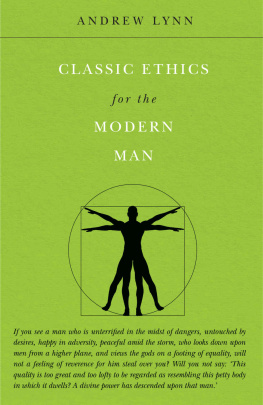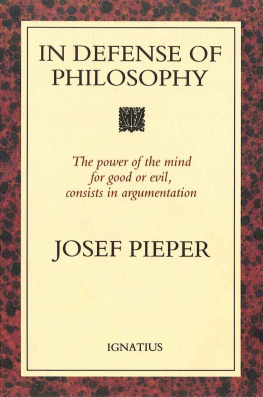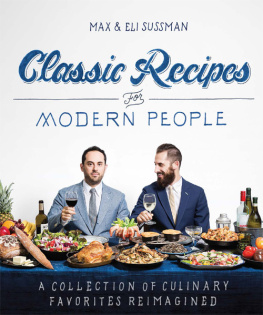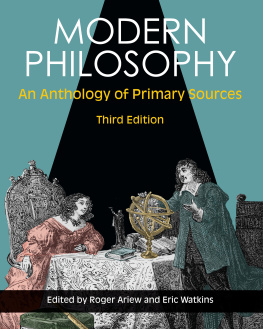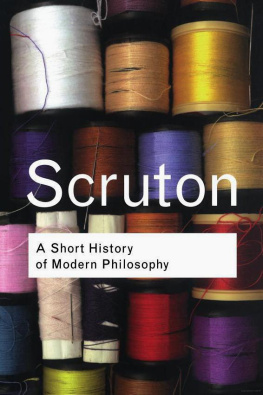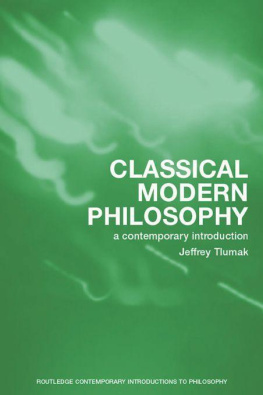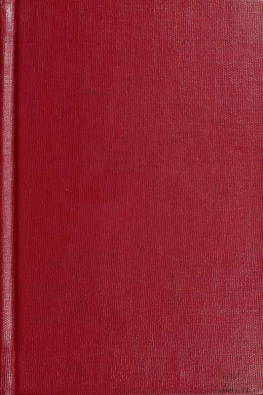Classic Philosophy for the Modern Man
Andrew Lynn has a Ph.D. in Renaissance literature from Cambridge University. He has lectured in Western civilization in Beijing and now practises law with a particular interest in the field of international dispute resolution.
www.andrewlynn.com
Classic Philosophy for the Modern Man
Andrew Lynn
Howgill House Books
www.howgillhousebooks.com
Copyright Andrew Lynn 2017
ISBN 978-1-912360-02-4
All rights reserved. No part of this publication may be reproduced, stored in a retrieval system, or transmitted, in any form or by any means, electronic, mechanical, photocopying, recording or otherwise, without the prior permission of the publishers.
Contents
How to live well?
There is no more important question than this.
The difficulty is not in finding an answer. Everybody (and their dog) is willing to give you an answer. But the answer they give is invariably their answer. It may be the answer reflecting their particular prejudices and preoccupations at this particular time. It may be the answer pointing in the direction of their particular commercial or political objectives. Or it may simply be the answer most widely circulated and seemingly at least widely accepted by the public at large.
This is where philosophy steps in as the boldest attempt to establish generally applicable principles for living well. Confident that philosophy at its best reaches further and probes deeper than other approaches to the great questions of life, we give you here a readable and thought-provoking selection from classic works of the very best thinkers from European, Asian, and American history. We start in the West with Plato, Aristotle, and Marcus Aurelius and in the East with Chuang-tzu each of whom provides fundamental rules for living and acting. From there we journey to Italy and Spain of the Renaissance where Machiavelli, Castiglione, and Gracin teach us how to obtain and exercise power, how to live gracefully, and how to advance in the world. Northern Europe is the next destination: from Germany, Nietzsche teaches nobility of soul, and from England William Hazlitt anatomizes success. Our final destination, fittingly, is the New World, from where Ralph Waldo Emerson speaks to us of the importance of being ones own man. Between them, these profound and inspirational thinkers tell a story of mankinds tussles with his predicament and provide solutions to a wide variety of his problems.
The unexamined life is not worth living, said Socrates famously, in a saying that has constituted the fundamental self-justification of many a professional and armchair philosopher. There is much to be said for a life lived in the unremitting pursuit of truth. These words are not, however, an unambiguous confirmation of the life of the mind. Socrates uttered them not in a moment of calm reflection but at his trial for corruption of Athenian youth and for impiety, having been found guilty and condemned to death by drinking hemlock. While the unexamined life is not worth living, then, might not the over-examined life be unliveable too?
This book, accordingly, charts a middle path between the life of the mind and life in this world. We are at all times interested in practical wisdom. Academic philosophy as taught in universities is remote from our concerns too much of it is pedantic, dry, and sterile. What you hold in your hands is a handbook for living: it is an account of how the greatest minds have spoken to us on how to grow and prosper as flesh-and-blood human beings. This they do, and they do with originality and panache. There will be no need for drinking of hemlock here.
Underlying and reconciling the many diverse approaches contained in this book is a single guiding principle that is best summed up in the phrase self-possession. Self-possession is what is needed to escape the unrealities of Platos cave and it is what is needed to achieve Aristotles golden mean. Self-possession in its various forms is what is needed to be an effective emperor (Marcus Aurelius), prince (Machiavelli), courtier (Castiglione), and man of the world (Gracin). The noble soul of Nietzsche and Emersons self-trusting man are marked by precisely the same quality.
You will be inspired and changed by these texts. They bear within them the possibility of new ways of thinking and living. They are the works of great beings speaking to us across the centuries.
Hear them. Listen to them. Let them in.
Plato, The Republic
Introduction
It has been said that the history of Western philosophy is but a footnote to Plato. It could equally well be said that all of Plato is but an elaboration of his allegory of the cave. The allegory of the cave from Book VII of his Republic is a dialogue between Socrates, Platos teacher, and Platos brother Glaucon. It is a profound reflection on the world of unreality what the Eastern religions call maya in which we live.
We are first to imagine human beings living in an underground den. Their legs and necks have been chained so that they cannot move and can only see what is in front of them. Behind these prisoners at a distance a fire is blazing. Between the fire and the prisoners is a low wall. Across the top of the wall, men carry vessels, statues, and figures of animals. Some of these men are talking and their voices echo off the cave walls.
What, then, would be the experience of these prisoners and how would they understand their own world? Of themselves, they would see nothing but their own shadows cast against the cave wall. Of the objects carried along the wall, they would likewise see merely shadowed forms. And of the talk of the men in the cave, they would hear only the echo, which to them would seem to emanate from the shadows on the wall. Their whole truth and reality would be nothing but this shadowy puppet-show.
Now imagine one of the prisoners is released and is able to make an escape. He will be pained and distressed by the brightness of the natural light flowing in from the mouth of the cave. He will still believe that the shadows that he formerly saw are truer than the objects he is being shown now. At first, he will stay with the shadows and reflections. Then he will venture out at night-time. Only at the end will he be able to behold the sun as the source of all that is.
Finally, imagine what would happen if the released man decided to liberate his fellow prisoners. He would have to return to the cave below to do that. Now, though, his sight would be unaccustomed to the darkness. To the prisoners below who have been busy conferring honours upon those who were quickest to observe the passing shadows and to remark which of them went before, and which followed after the returned man with his ineffective vision would seem ridiculous. Better not to even think of ascending, they would conclude. And, should anyone think of releasing another well, let him be killed.
Plato gives his own interpretation of the allegory: the prison-house, he says, is the world of sight. We are trapped, then, in an illusory world created by the senses and condemned to see only the shadows of true reality. Academic philosophers at this juncture invariably refer to Platos theory of Forms. The Forms are the unchanging essences such as beauty, truth, courage, and goodness that support the ever-varying particular manifestations of themselves. It is these and these alone that have true substantial reality.
Theres nothing wrong with that explanation. But Platos allegory is just as much concerned with what can be called the experience of awakening. It tells of how easy it is to become trapped in a false world without knowing it: all that is required for us to go along with the fiction is for the components of the false world to appear consistent with each other. It tells of the process of awakening, which is impeded and interrupted by bouts of pain and denial. And it tells of the alienation and isolation of the awakened one from his fellow men. Far from conferring glory or honour, the returning truth-bearer is perceived as defective and inadequate. The rewards of awakening are not easily shared. And yet those rewards are real the power to act rationally both in public and in private life.


